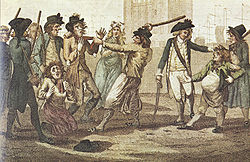Conscription in Germany
Germany has conscription ("Wehrpflicht") for men. Women may volunteer as professional soldiers and are allowed to perform the same jobs as men since 2000, though they are not drafted. A conscientious objector may petition for permission to do "alternative service" ("Wehrersatzdienst") which is usually accepted. The "Grundwehrdienst" consists of three month basic combat training and individual training, then six month service on the assigned post. The conscripted soldier will normally reach the rank of "Obergefreiter" (NATO code OR-3 "PFC"). During his service he gets free health care, housing, food and a railway ticket. Conscripts get paid about 9 EUR per day of basic pay plus several other perks such as distance-from-home pay, additional food pay etc. An Obergefreiter (month 6-9) would receive up etc., but he has to agree to go on an International Mission, e.g. ISAF, if needed. Normal conscripts will not" is only one component of conscription. Women were allowed to serve in medical and music bands after 1975, but not other services until a case brought by Tanja Kreil by the European Court of Justice ruled in her favor to allow women. As a result Germany changed its laws to allow this, though not for conscription.
German law provides several options for conscientious objectors to perform alternative public service instead of a weapons-based military service. The conscientious objection is normally accepted without any problem, it is no longer required to state the request before a board. One just has to "write a letter", outlining ones moral objections to military service.
- The main alternative is the "civilian service" ("Zivildienst"), lasting for nine months, in which the objector may find employment with a civilian institution that renders a public service, such as a hospital, rehabilitation center or assisted living facility for the aged. After completing his nine months, the CO will remain as a kind of "civilian reservist", because he may be drafted in case of defence to serve in a hospital, fire dept. etc.
- There is also the alternative of disaster intervention services ("Katastrophenschutz"), in which the objector is required to serve in non-combatant, state-run institutions such as the Technical Aid Corps ("Technisches Hilfswerk" or THW), Voluntary Fire Department or other emergency assistance and crisis management agencies. He is required to serve for at least seven years (on part-time basis) in one of these institutions. As long as he serves, he will not be drafted. When he completes his seven year turn, he will not be drafted for basic civilian service ("Zivildienst"), but remains available in case of defence.
- The third alternative permitted by German law is for the objector to become a foreign "development helper" ("Entwicklungshelfer"), which means that the person will be expected to work in a technical capacity in a recognized "developing country" for a period of not less than eighteen months. To qualify for this option, the objector has to have completed formal vocational training or an educational program that grants a recognized qualification in a marketable skill making the objector a useful asset in a developing host country. The objector is responsible for personally making all of the arrangements in order to engage in this alternative service. Many objectors who choose this option, become so engrossed in the developmental needs of such countries that they stay abroad many years longer than the legal requirement. The disproportionately high percentage of German nationals found in many international aid, conservation, medical and technical assistance organizations active in developing countries may be directly attributable to this trend.
- A fourth alternative to army service is to do one year of voluntary service in a social or environmentalist institution, called "Freiwilliges Soziales Jahr" (FSJ) and "Freiwilliges Ökologisches Jahr" (FÖJ), respectively.
Another provision allows the third son of a family to be completely exonerated from military service, if his older brothers participated. Of course, voluntary enrollment is always possible. Policemen and students of theology are also exempt from the draft in Germany. For medical students it is possible to delay their military duty until they have finished medical school and then serve as medical officers. The same thing is possible for pharmacists and veterinaries.
The ongoing political debate over whether the German Federal Defense Force should be converted into a purely volunteer-based, professional army raises questions about the military draft policy. Since the current process selects an ever-decreasing number of men from each succeeding generation, conflicting views abound regarding the effect of the selection, both in terms of the overall quality of the force and the general fairness of the system. The final decision will most likely be influenced by the enhanced or even reduced roles that such a new "army" would be expected to play in German society in the years to come.
Furthermore would by making the Bundeswehr fully voluntary-based the amount of people working in care of children and elder people drop considerably. Due to the pay modalities those care facilities would lose personnel payed essentially nothing.

